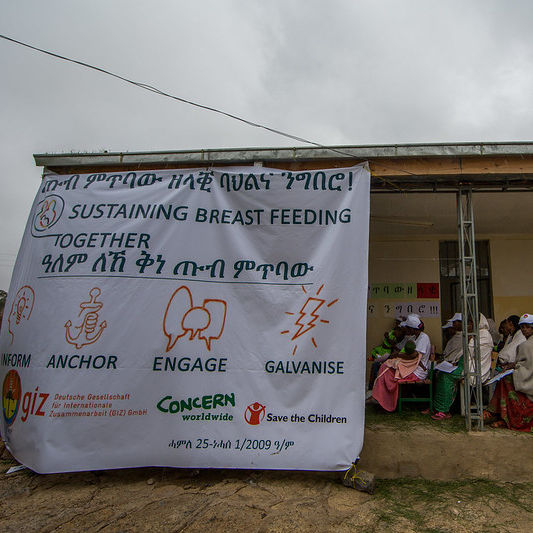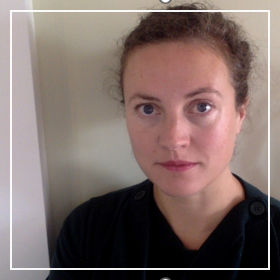One scalding hot June day in 2014 in a remote village health post in North Shewa, Ethiopia, I attended an event intended to provide information and advice about breastfeeding and nutrition for pregnant and lactating women. This content of the event adhered to national guidelines, drawn from global standards developed by the World Health Organisation and Unicef and adapted for the Ethiopian context by the government and its international partners (e.g. FDRE 2016a). Implementation of these guidelines is included in the ‘package’ of work for which state-employed health extension workers are ultimately responsible at community-level, as well as through a patchwork of interventions by multilateral and non-governmental organisations. This particular training, for example, was run by a British NGO and overseen by a man who I will call Dibaba, who had previously been a regional level government employee and was now the zonal coordinator for the NGO’s nutrition programme. By taking this job, he had gone down one rung in the governmental hierarchy, but no doubt up many salary grades. Middle-aged with a paternalistic manner and dressed in the palette of grey, beige and muted green favoured by the professional classes, Dibaba was well-versed in the modalities of such meetings, known as “trainings”.
As on this occasion, training usually involved an outside expert, invariably male, lecturing groups of local people about what they should be doing to improve their lives, while they listened without asking questions.
This particular occasion focused on breastfeeding and maternal nutrition, and on how to supplement breastmilk with porridge in the diets of children over the age of six months. It was accompanied by a demonstration of porridge making, as per the ‘Practical Cooking Demonstration Session’ contained in the codified national targets for nutrition services for infants and young children aged six to twenty-four months (FDRE 2016a).
Standing in front of many breastfeeding women, Dibaba urged them to feed their children porridge and not sweets. “You can also add many things to porridge to make it more nutritious,” he went on, giving the examples of tomatoes, eggs and cabbage. A handful of women listened attentively at the front. Another woman who lived in Addis Ababa but was visiting relatives in the village voluntarily joined in with the porridge cooking, adding to my impression that there was some social cachet involved in novel ideas about how best to nourish children and their mothers. From my position at the back, however, I could see that most of the women were unimpressed. I overheard (not very quiet) comments, such as: “You don’t put tomatoes in porridge! Ay chewata! (what a joke!).” One woman fished a dirty lollipop out of her pocket for her toddler while Dibaba was exhorting them not to feed children sugar, in what was either unthinking coincidence or deliberate defiance. When he advised a pregnant woman to eat healthy food such as papaya and avocado – neither of which were grown locally or sold at the market – she openly scorned his suggestion.
The women present at the event were vocal about the absurdity of Dibaba’s irrelevant, unwanted or impractical advice.
Their response was echoed in the reception to other interventions by the state and its global counterparts, such as inappropriate sanitation programmes that prompted local people to construct fake latrines in an effort to avoid state surveillance (Howard, under review). This particular episode focused on infant nutrition also poses questions about priorities, power and perceptions of tradition. As the pioneering anthropologist of birth Brigitte Jordan writes, the consensus about what counts as ‘authoritative knowledge’ in a particular domain – or, how one system of knowledge gains legitimacy over other competing systems – is often ‘associated with a stronger power base’ (1997:36). A consequence of the ascendency of one kind of knowledge is the ‘devaluation, often the dismissal, of all other kinds of knowing’ (ibid.).
Ethiopia has extremely high rates of both exclusive (Bhattacharjee et al 2019) and continued breastfeeding. Data from UNICEF (2021) show that 81.1% of women continue to breastfeed their children aged 12 – 23 months, echoing older research that shows very high rates of breastfeeding in rural areas (e.g. Knutsson and Melbin 1969). As elsewhere in Africa, overall rates of breastfeeding in Ethiopia are many times higher than in the Global North. For example, data from the UK that show that only between 0.5% and 10% of mothers are breastfeeding by the time their child is 12 months old (Victora et al 2016). In 2016, the BBC called the UK ‘the world’s worst’ at breastfeeding.

In the years following the training event I attended in North Shewa, I had two children of my own while living in both Britain and Ethiopia. In Ethiopia women angrily hissed at me “t’ut’ inde!” – an expression of surprise, often disapproving – when I failed to placate my crying toddler son on a rural bus trip a long time after I had stopped breastfeeding him for good. Meanwhile, in Britain, there was plenty of NHS material available highlighting the advantages of breastmilk for children’s growth and development and encouraging me to breastfeed, but no-one showed me how to make porridge. Unlike in rural Ethiopia, multiple varieties of formula milk are sold everywhere and public facilities for babies are marked with the symbol of a bottle.
I found certain aspects of my breastfeeding experience in Britain entirely absent in Ethiopia, for instance the way that breastfeeding in public could act as a subtle marker of class privilege, the angst many women in the UK experienced over their infant feeding choices, and lingering elements of shame. In a rare case of direct disapproval, a family friend told me he found the sight of me breastfeeding “disgusting”. Similarly, while breastfeeding my daughter in the corridors of a conference organised by the American Anthropological Association, several female attendees verbally toasted me as they walked past with “great job mommy!” – a level of attention and approval that casts breastfeeding as a moral act rather than, as in across Ethiopia, a literally unremarkable one.
These personal experiences led me to reflect on the child nutrition event that summer in North Shewa and to cast it in a retrospectively absurd light.
How could it be, I wondered, that breastfeeding in particular was the focus of global funding and attention when almost all Ethiopian women already breastfeed for extended periods? In a rural area with no clean water, electricity or all-weather road, how was this issue construed as a priority for intervention? Why are mothers being advised to eat healthy food they cannot buy or do not like? In light of the massive disparities in breastfeeding rates between Ethiopia and, for example, the UK (as both the ‘world’s worst’ and by chance, the funder and organiser of the event I attended), why were Ethiopian women not being invited to advise British women on the secret to their success in this regard? And why does this latter rhetorical question itself read as absurd, in the sense that it would never happen?
The absurdity here does not relate to the serious subject of maternal and child nutrition in Ethiopia – an issue that has particularly come to the forefront [link: https://reliefweb.int/report/ethiopia/ethiopia-situation-report-7-sep-2023] since widespread and continuing conflict across the country that has intensified since 2021. Nor does the absurdity relate to the laudable aims of the government and others to improve this situation. It is also obvious that there are many reasons why the Ethiopian context does not map onto the British context in a way that would make transferable advice straightforward. Rates of female formal employment and access to contraception diverge markedly, to mention just two relevant factors.
But are there other considerations that inform how and why Ethiopian mothers are the subject of absurd advice on how to nourish their babies, rather than models of maternal feeding practice?
Perhaps one answer is in the word that used to describe these events as ‘trainings’ in English; silt’ena in Amharic. The verb “to train” in Amharic – አሠለጠነ – can also be translated as “to civilise”, indicating an orientation to behavioural change that draws on assumptions of not just junior but inferior status, and of the need to provide guidance for people on how to conduct their lives. As the trainer Dibaba spoke during the event I attended, as well as in a subsequent conversation with me, it was clear that one part of the rationale for intervening to correct the way women practised breastfeeding, fed their children, or ate while pregnant was based on disapproval of so-called ‘harmful traditional practices’. In this area of Ethiopia, these apparently included rejecting the early milk, or colostrum, and the belief that pregnant women should not eat bananas, milk or porridge in the last trimester as they are too heavy for the foetus – ‘apparently’ because some local women denied to me that these practices occurred. As written into national policy, ‘harmful traditional practices’ such as these are said to ‘contribute… to the poor nutritional status of the majority of infants, young children and women in Ethiopia’ (FDRE 2016b:69). Prevalent attitudes towards all kinds of ‘harmful traditions’ that affect women’s bodies, from female circumcision to scarification practices, often map onto existing fault lines in a multi-ethnic state that has historically been dominated by highland- and Orthodox Christian-dominated polities. They also echo wider colonial histories of reforming maternal practices in the global South, which were often premised on the characterisation of tradition and custom as problematic (e.g. Saha 2017; Hunt 1988), in particular where they were seen as threatening to the structure of the nuclear family through practices of distributed mothering (Whyte 2020).
Critically however, the training conducted by Dibaba did not acknowledge the many norms, values and practices that support the practice of longterm breastfeeding and therefore help to place Ethiopia in the global forefront of extended breastfeeding practice. These include the exemption of breastmilk from religious precepts about the polluting nature of bodily fluids in Ethiopian Orthodox Christianity, the majority religion in the area where the training took place.

Norms about bodily exposure are suspended during breastfeeding, while the period of aras bet, or seclusion of post-partum women, during which time they do not leave the compound or do any housework and are fed rich food, is also an opportunity for mothers to firmly establish a pattern of on-demand breastfeeding. Furthermore, mothers expressed a strong sense of maternal identity, in which providing breastmilk for their children is both a crucial part of their loving and caring role while also being seen by my interlocutors as entirely routine and unproblematic.
The absurdity here, then, arises from the mismatch between local realities and standardised advice that focused on women’s individual (‘harmful’) behaviour while ignoring supportive norms and practices, and which at the same time did not address questions of access, structural barriers or local priorities. As such, ethnographic attention to the absurd reveals the longstanding hierarchies of power and value in the construction of ‘authoritative knowledge’ around women’s bodies and intimate practices of feeding.
References
Bhattacharjee, Natalia V., Lauren E. Schaeffer, Laurie B. Marczak, Jennifer M. Ross, Scott J. Swartz, James Albright, William M. Gardner, Chloe Shields, Amber Sligar, Megan F. Schipp, Brandon V. Pickering, Nathaniel J. Henry, Kimberly B. Johnson, Celia Louie, Michael A. Cork, Krista M. Steuben, Alice Lazzar-Atwood, Dan Lu, Damaris K. Kinyoki, Aaron Osgood-Zimmerman, Lucas Earl, Jonathan F. Mosser, Aniruddha Deshpande, Roy Burstein, Lauren P. Woyczynski, Katherine F. Wilson, John D. VanderHeide, Kirsten E. Wiens, Robert C. Reiner Jr, Ellen G. Piwoz, Rahul Rawat, Benn Sartorius, Nicole Davis Weaver, Molly R. Nixon, David L. Smith, Nicholas J. Kassebaum, Emmanuela Gakidou, Stephen S. Lim, Ali H. Mokdad, Christopher J. L. Murray, Laura Dwyer-Lindgren and Simon I. Hay. 2019. ‘Mapping Exclusive Breastfeeding in Africa Between 2000 and 2017.’ Nature Medicine 25, 1205–12.
Federal Democratic Republic of Ethiopia (FDRE). Ministry of Health. 2016a. National Guideline on Adolescent, Maternal Infant and Young Child Nutrition. Addis Ababa.
–. National Nutrition Coordination Body. 2016b. National Nutrition Program, 2016 – 2020. Addis Ababa.
Howard, Sarah. Under review. ‘Counting Fake Latrines: Performing the State in Rural Ethiopia’. Social Anthropology / Anthropologie sociale.
Hunt, Nancy Rose. 1988. ‘”Le Bébé en Brousse“: European Women, African Birth Spacing and Colonial Intervention in Breast Feeding in the Belgian Congo.’ International Journal of African Historical Studies 21(3), pp. 401-32.
Jordan, Brigitte. 1997. ‘Authoritative Knowledge and Its Construction’. In Childbirth and Authoritative Knowledge: Cross-Cultural Perspectives, edited by Robbie E. Davis-Floyd and Carolyn Fishel Sargent, pp. 55-79. Oakland: University of California Press.
Knutsson, Karl Eric, and Tore Melbin. 1969. ‘Breast Feeding Habits and Cultural Context: A Study of Three Ethiopian Communities.’ The Journal of Tropical Paediatrics, 40-49.
Saha, Ranjana. 2017. ‘Milk, Mothering and Meanings: Infant Feeding in Colonial Bengal’, Women’s Studies International Forum lx, 97–110.
UNICEF. 2021. UNICEF Global Databases: Infant and Young Child Feeding: Continued Breastfeeding. New York: UNICEF, Division of Data, Analysis, Planning and Monitoring.
Victora, Cesar G., Nigel C. Rollins, Simon Murch, Julia Krasevec, and Rajiv Bahl. 2016. ‘Breastfeeding in the 21st Century – Authors’ Reply.’ The Lancet 387(10033):2089-90.
Whyte, Christine. 2020. ‘Mothering Solidarity: Infant-Feeding, Vulnerability and Poverty in West Africa since the Seventeenth Century.’ Past and Present, Suppl 15:54-92.
Featured image by Unicef Ethiopia on Flickr (CC BY-NC-ND 2.0 Deed)






Wonderful piece! Though your piece is more (refreshingly) personal, your perspective echoes a growing set of parallel critiques of ethically problematic “interventions” into child-rearing practices in communities across the Global South (e.g. one I’ll link here). https://journals.sagepub.com/doi/abs/10.1177/0022022117746241
Thank you! And thank you for the link – I loved reading such a robust case for using ethnography in critiquing early childhood interventions. And it is a really interesting perspective for an article I am currently writing about socialist kindergartens in Ethiopia.
Thank you!
Sarah